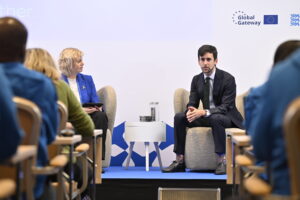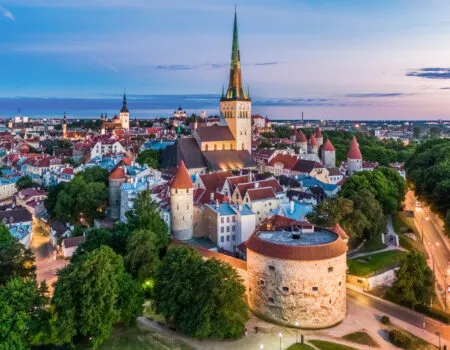Place to learn, connect, and lead in the digital era
The EU-funded Tallinn Cyber Diplomacy initiative brings together diplomats, policymakers, and experts to tackle the challenges of cyberspace and turning knowledge into action.

About the project
The Tallinn Cyber Diplomacy Project is a global initiative designed to advance cyber diplomacy and strengthen international cooperation in addressing cybersecurity challenges. It focuses on building a free, open, stable, and secure cyberspace, grounded in EU values of democracy, human rights, and the rule of law.
Through its key components:
- Summer School,
- Winter School,
- Alumni Network, and
- Fellowship Program
the project equips diplomats, policymakers, and cybersecurity professionals with the skills, knowledge, and connections needed to tackle complex cyber issues and shape international cyber policies.
Funded by the European Commission’s Directorate-General for International Partnerships (DG INTPA), the project runs from September 2024 to August 2029 and fosters a sustainable global network of cyber diplomats. By promoting cooperation and capacity-building, it strengthens international cyber resilience and supports the development of effective cyber governance frameworks.

The Role of the European Commission
The European Commission, through its Directorate-General for International Partnerships (DG INTPA), supports the project financially and leads the vision to:
- Promote cyber resilience and secure digitalisation worldwide.
- Support international law and EU values in cyberspace governance.
- Offer capacity-building programs to strengthen cybersecurity frameworks globally.

EU Cybersecurity Strategy
This project aligns with the EU Cybersecurity Strategy and the EU Cyber Diplomacy Toolbox, reinforcing Europe’s role in:
- Advancing international norms and confidence-building measures.
- Responding to cyber threats through diplomatic actions and sanctions when necessary.
- Supporting partner countries in the Global South, Eastern Partnership, and Western Balkans.

Why Tallinn?
Tallinn, Estonia – Where Digital Innovation Meets Cybersecurity Excellence
- Tallinn is the perfect setting for shaping the future of cyber diplomacy. Estonia is a global pioneer in digital transformation, renowned for its e-governance solutions, cybersecurity expertise, and commitment to openness and innovation.
- Estonia was the first country to offer online voting and has built one of the world’s most advanced e-government systems, inspiring nations to embrace digitalization securely and efficiently.
- Estonia is home to NATO Cooperative Cyber Defence Centre of Excellence (CCDCOE) and has played a key role in shaping international cyber norms and frameworks following the world’s first large-scale cyberattack in 2007.
- As a small but digitally advanced nation, Estonia demonstrates how cyber resilience and international cooperation can create a secure and open digital society—principles that form the foundation of the Tallinn Cyber Diplomacy Project.
- From medieval charm to cutting-edge innovation, Tallinn combines history and modernity, offering an inspiring environment for dialogue, learning, and forging connections that shape the future of cyber diplomacy.
Directorate-General for International Partnerships (DG INTPA), is the European Commission‘s department responsible for formulating the EU’s international partnership and development policy, with the goal to reduce poverty, ensure sustainable development, and promote democracy, human rights, and the rule of law across the world.
The Ministry of Foreign Affairs of Estonia ensures Estonia’s security and well-being by advancing its interests globally through strategic foreign policy and international cooperation. Estonia has been actively supporting cyber capacity building in developing and partner countries for over a decade and remains committed to enhancing global cybersecurity resilience.
eGA is a centre of excellence dedicated to increasing societal prosperity and transparency through digital transformation. Over the past 20 years, eGA has collaborated with over 280 organisations across 141 countries, assisting governments in improving national cybersecurity and enhancing cyber frameworks and skills. Since 2016, eGA has been developing and managing the National Cyber Security Index (NCSI) – a global tool measuring countries’ preparedness to mitigate cyber threats and manage cyber incidents.
ESTDEV is a trusted partner helping to organise the Tallinn Cyber Diplomacy Summer Schools in Estonia.
Estonian Centre for International Development (ESTDEV), is a government-founded and funded organisation created to manage and implement Estonia’s development cooperation programs and Estonia’s participation in global development initiatives. Through partnerships and investments, ESTDEV aims to reduce poverty, strengthen democratic governance, build sustainable economies and help people emerge from humanitarian crises and progress beyond assistance. By sharing Estonia’s successful reform experience in digital transformation, ESTDEV promotes safe, transparent and human centric e-services in all areas.
The EU CyberNet and LAC4 are trusted partners for organising the Tallinn Cyber Diplomacy Winter School 2025 in Santo Domingo, Dominican Republic.
The European Union External Cyber Capacity Building Network – or the EU CyberNet – launched in September 2019 for a duration of four years. Its purpose is to strengthen the global delivery, coordination and coherence of the EU’s external cyber capacity building projects, and reinforce the EU’s own capacity to provide technical assistance to third countries in the field of cybersecurity and countering cybercrime. The EU CyberNet is a project led by the Estonian Information System Authority in consortium with competent authorities from Finland, Germany and Luxembourg that aims to create a network of cyber experts and establish a community of stakeholders to support the EU and implement its cyber capacity building initiatives in EU‘s partner countries.